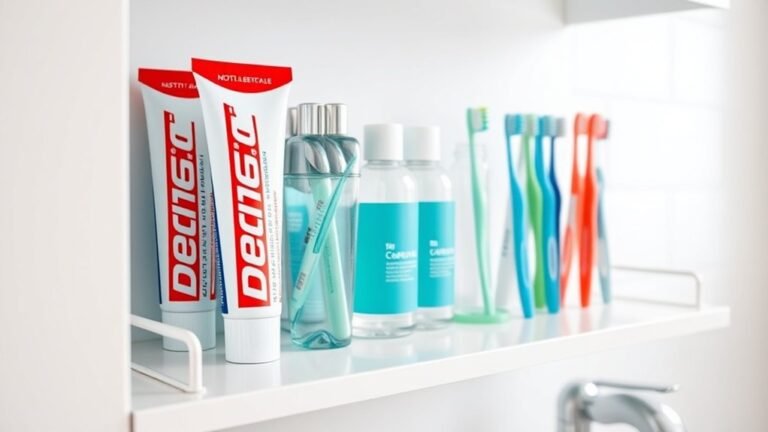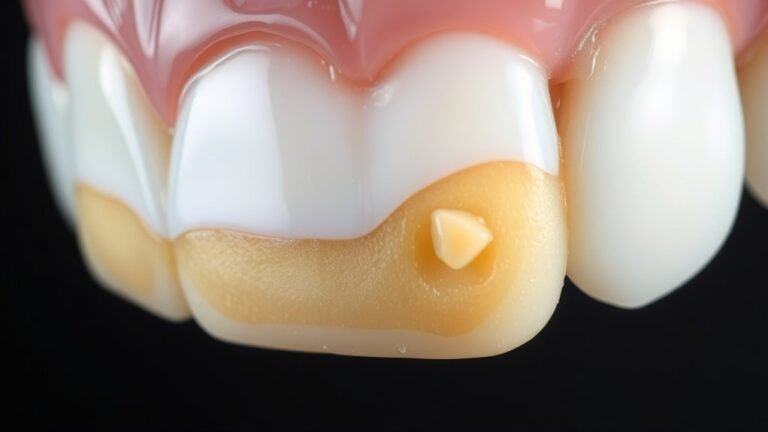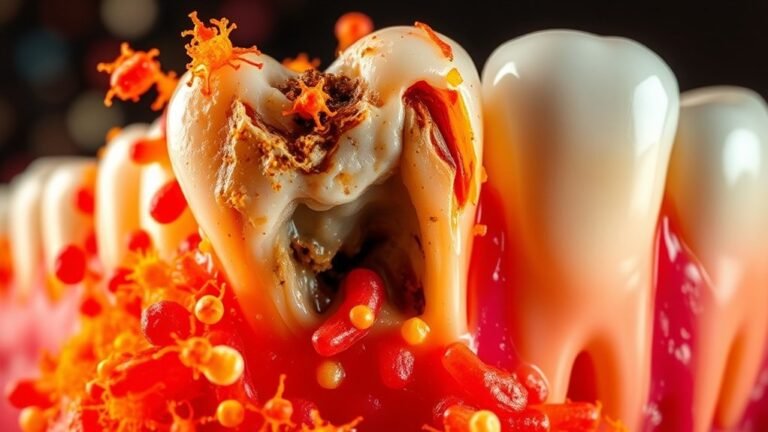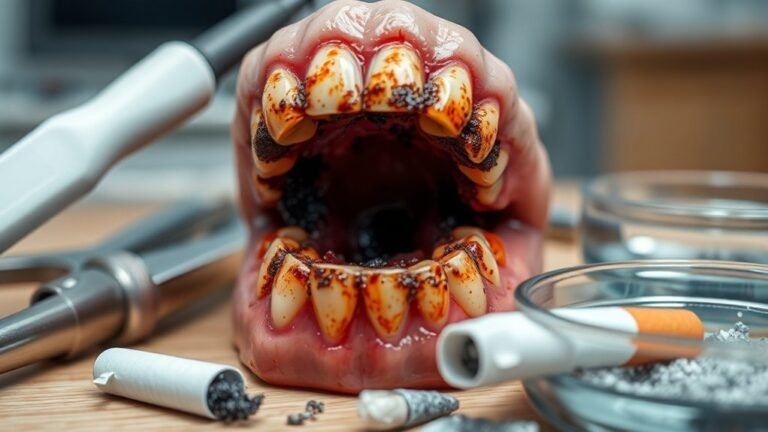Can Chewing Xylitol Gum Reduce Streptococcus Mutans in the Mouth
Chewing xylitol gum can effectively reduce levels of Streptococcus mutans in your mouth, helping to prevent cavities. Xylitol inhibits the growth of harmful bacteria, stimulates saliva production, and promotes a healthier oral environment. By incorporating it into your routine after meals, you complement your brushing and flossing efforts. This proactive step is key to maintaining oral hygiene. Discover more about the mechanisms and benefits behind this sweet alternative that can enhance your dental health.
Key Takeaways
- Chewing xylitol gum inhibits the growth of Streptococcus mutans, a major contributor to tooth decay.
- Regular use of xylitol gum leads to reduced levels of harmful bacteria in the mouth.
- Xylitol stimulates saliva production, helping neutralize acids and wash away food particles.
- Clinical evidence supports xylitol’s effectiveness in lowering cavity risks and improving oral health.
- Incorporating xylitol gum into daily oral hygiene can enhance overall dental care, complementing brushing and flossing.
Understanding Streptococcus Mutans and Its Role in Tooth Decay
While many bacteria reside in your mouth, Streptococcus mutans plays a particularly significant role in tooth decay. This bacterium metabolizes sugars and produces acids, which demineralize tooth enamel, leading to cavities. Understanding the mechanisms of S. mutans is essential for effective tooth decay prevention. High sugar intake fuels its growth, making dietary choices pivotal in managing oral health. Regular dental hygiene practices, such as brushing and flossing, help reduce its population. Additionally, using products containing fluoride can strengthen enamel against acid attacks. By being aware of how S. mutans operates, you can implement strategies to mitigate its impact, ultimately enhancing your oral health and reducing the risk of decay.
What Is Xylitol and How Does It Work?
Xylitol, a natural sugar alcohol found in various fruits and vegetables, serves as an effective alternative sweetener with notable dental benefits. When you chew xylitol gum, it can help in bacterial control by inhibiting the growth of harmful bacteria like Streptococcus mutans, which contributes to tooth decay.
| Property | Xylitol | Sugar |
|---|---|---|
| Sweetness | Comparable | High |
| Dental Impact | Reduces decay risk | Increases decay risk |
| Caloric Value | Fewer calories | Higher calories |
Incorporating xylitol gum into your routine not only satisfies your sweet tooth but also promotes a healthier oral environment, making it a valuable option for dental health.
The Science Behind Xylitol Gum and Oral Health
Chewing xylitol gum can greatly impact oral health by targeting the bacteria responsible for tooth decay. Xylitol inhibits the growth of Streptococcus mutans, the primary culprit behind cavity formation. By reducing these harmful bacteria, xylitol promotes plaque reduction, which is essential for maintaining a healthy mouth. When you chew xylitol gum, it stimulates saliva production, further aiding in the neutralization of acids and washing away food particles. This process not only supports cavity prevention but also enhances the remineralization of tooth enamel. The unique properties of xylitol make it an effective tool in your oral hygiene routine. Incorporating xylitol gum can lead to significant improvements in your overall dental health, reducing the risk of cavities and promoting a cleaner, healthier mouth.
Evidence From Clinical Studies on Xylitol and Bacteria Reduction
Clinical studies provide substantial evidence supporting the effectiveness of xylitol in reducing levels of Streptococcus mutans in the oral cavity. Research indicates that regular consumption of xylitol gum considerably lowers this bacterium, which is a primary contributor to dental caries. In various clinical trials, participants who chewed xylitol gum displayed a marked decrease in Streptococcus mutans levels compared to those who didn’t. This reduction helps promote a healthier oral microbiome, as xylitol inhibits the growth of harmful bacteria while encouraging beneficial ones. Consequently, integrating xylitol into your oral care routine can potentially lower your risk of dental caries and improve overall oral health. These findings underscore the importance of xylitol in managing oral bacteria effectively.
Incorporating Xylitol Gum Into Your Oral Hygiene Routine
Incorporating xylitol gum into your oral hygiene routine can substantially enhance your dental health, especially if you’re aiming to reduce harmful bacteria like Streptococcus mutans. Chewing xylitol gum stimulates saliva production, which helps neutralize acids and promotes a healthier environment in your mouth. This is essential for maintaining effective oral hygiene, as it can counteract the negative effects of sugar metabolism, which feeds harmful bacteria. Aim to chew xylitol gum after meals or snacks to maximize its benefits. Additionally, make certain that you’re not relying solely on gum; continue regular brushing and flossing to maintain overall dental health. By integrating xylitol gum into your routine, you’re taking a proactive step towards better oral hygiene and cavity prevention.
Frequently Asked Questions
Can Children Safely Chew Xylitol Gum?
Yes, children can safely chew xylitol gum. It’s generally considered safe for kids, but always monitor their chewing habits and guarantee they don’t swallow gum. Consult a pediatrician for personalized advice if needed.
Are There Any Side Effects of Xylitol Gum?
You might experience mild digestive issues like gas or diarrhea when chewing xylitol gum, especially in large amounts. However, these side effects are generally temporary and resolve once your body adjusts to the sweetener.
How Often Should I Chew Xylitol Gum?
To keep your oral health in tip-top shape, chew xylitol gum three to five times daily, especially after meals. Consistency’s key, as it helps maximize benefits while minimizing the risk of tooth decay.
Does Xylitol Gum Replace Regular Brushing and Flossing?
No, xylitol gum doesn’t replace regular brushing and flossing. It can complement your oral hygiene routine by reducing bacteria but shouldn’t substitute for essential practices that maintain overall dental health and cleanliness.
Is Xylitol Gum Safe for Pregnant Women?
Yes, xylitol gum’s safety for pregnant women is generally supported, like how many enjoy a warm cup of tea. However, it’s always best to consult your healthcare provider to ascertain it’s right for your situation.
Conclusion
Incorporating xylitol gum into your oral hygiene routine can be a proactive step in reducing Streptococcus mutans, promoting dental health, and enhancing your overall well-being. By chewing xylitol gum regularly, you can actively combat harmful bacteria, support saliva production, and reduce the risk of cavities. Consequently, make xylitol gum a part of your daily regimen, boost your oral health, and enjoy a brighter smile—all while fighting against tooth decay effectively and efficiently.






